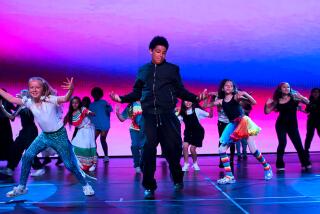Carmelita Maracci, the Dancersâ Dancer, Dies
Carmelita Maracci, whose consummate dancing skill and willingness to experiment drew the admiration of other professionals but who was driven by her dread of insensitive criticism into what she called the âunplanned oblivionâ of teaching, has died at her Laurel Canyon home, her husband said Wednesday. She was believed to be 76.
Such well-known figures as Leslie Caron, Janice Rule, Jerome Robbins, and Geraldine and Charlie Chaplin were taught by Miss Maracci, who in later years was so crippled by arthritis that she coached or lectured while seated.
Robert Joffrey, founder and artistic director of the Joffrey Ballet, said of her two years ago, âThere was, and still is, no one like her. She had incredible strength and supreme delicacy. Her technique was astonishing, perfection itself. . . .â
Weakened by Flu
Miss Maracci suffered a massive heart attack last February, but was recovering when she was weakened by the flu, said her husband, Lee Freeson. She died on Sunday night when her heart failed.
Although regarded by her peers as one of the leading dancers in the United States, writer Donna Perlmutter noted in a 1985 Timesâ Calendar profile that Miss Maracci shrank from the concert stage after two experiences that devastated her.
One was a 1946 performance in St. Paul, where a rowdy heckler prompted her to demand that the curtain be closed. The theater manager canceled her contract and impresario Sol Hurok dropped her.
Five years later, she staged for American Ballet Theatre a work entitled âCirco de Espana,â but was told by famed dancer Agnes DeMille that the ballet was âno good.â That ended Miss Maracciâs association with Ballet Theatre.
Modern dance company founder-director Bella Lewitzky, who is also founder of the Dance Gallery being installed on Bunker Hill, told Perlmutter that Miss Maracciâs technique was unmatched.
âShe did beats coming down,â Lewitzky said, ânot going up the way everyone else does, with her little heels pressed forward like tiny, perfect arrows.â
Miss Maracci was, Lewitzky said, âsteel and passion. . . . She knew the difference between technical feats and high art . . . her dedication to the latter was uncompromising.â
But audiences, Lewitzky observed, âwerenât ready for her dramatic insights into the human condition. They wanted pageantry and prettiness.â
âPeople tell me that my unplanned oblivion was a tragedy,â Miss Maracci said of herself. âBut I say no. Save that word for human suffering, for wars that kill innocent people, for the devastation of the poor and unwanted, for the corruption and cruelty that cause these things in the world. Mine is no tragedy. If art could relieve misery, Iâd gladly sacrifice it.â
Contrary to publicity that she was born in Montevideo, her husband said Miss Maracci was born in Goldfield, Nev., âin approximately 1911.â She was christened Adalina Patti Maracci, but took on the name Carmelita early in her dancing career. Among her teachers was the Italian ballet master Enrico Zanfretta.
Her husband said her physical problems were in a large part due to having injured herself when she slipped and fell on a Kansas stage during the late 1940s. She continued to dance, he said, going through a grueling concert schedule that worsened her condition.
No services are planned, Freeson said.
More to Read
The biggest entertainment stories
Get our big stories about Hollywood, film, television, music, arts, culture and more right in your inbox as soon as they publish.
You may occasionally receive promotional content from the Los Angeles Times.










